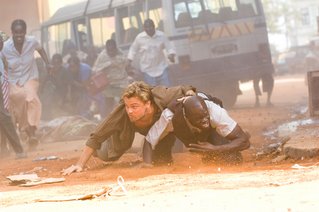Chuck Koplinski Reviews "Blood Diamond"
This week, Chuck Koplinski reviews the latest film from director Edward Zwick, "Blood Diamond."

Blood Diamond – 3 Stars
Rated R – Running Time – 2:30
By Chuck Koplinski
Director Edward Zwick tries to have his cake and eat it too with his latest, Blood Diamond. In striving to deliver not only a bracing action film but a socially relevant expose on the dire state of modern Africa as well, the filmmaker succeeds, for the most part in rattling viewers and driving them to tears. Without question, the film sports a timely and worthwhile agenda and is at its best when it brings to the fore the horrendous conditions facing the millions of poor living in Sierra Leone and South Africa. However, what prevents this fine film from being the classic it strives to be is its bloated running time and less-than-cohesive script that relies, far too often, on coincidence when common sense would suffice.
Set in 1999 during the civil war that ravaged Sierra Leone, Diamond concerns a tenuous alliance between three strong-willed individuals who have no problem using each other for their own means. Having been arrested for diamond smuggling, Danny Archer (Leonardo DiCaprio) is desperate to get his hands on a massive stone that he’s heard former prisoner Solomon Vandy (Djimon Hounsou) has found and hidden while being forced to work for the rebel forces intent on ousting the powers-that-be. Vandy agrees to help Archer find the diamond when the smuggler promises to help him find his family, that’s been displaced by the fighting raging around them. Unfortunately, the stone has been buried deep in the African bush and the duo finds it impossible to breach this territory as it’s been cordoned off by the government. Enter reporter Maddy Bowen (Jennifer Connelly), who longs to expose the connection between the world’s largest diamond buyer and those that supply them with conflict stones that come from Sierra Leone, the sale of which fund the rebel movement. Bowen agrees to help Archer and Vandy in their search, as she has access to the area where they need to travel, but only if the smuggler assists her by supplying the names of his high-profile customers.
Not only does the script by Charles Leavitt juggle these three storylines but it also includes the plight of Vandy’s son, Dia (Caruso Kaypurs). Abducted by Captain Poison (David Harewood), the very same rebel leader who Vandy was held prisoner by, the young boy is being brainwashed into becoming a child soldier of the revolution. Time and again, Zwick underscores just how many people have been displaced by the rebel fighting and just how vast the land is where this conflict occurs. In showing us a refugee camp where one million homeless people are being held and chronicling the long trek that Archer and Vandy set out on, chance meetings that occur between characters and the connection between Poison and the Vandy’s seem implausible and border on the ridiculous.
However, Zwick does not let us focus for long on these narrative flaws as he assails the viewer with one atrocity after another throughout. While Connelly gives an uncharacteristic weak and obvious performance, her character plays a pivotal role in the film as through her eyes we see the plight of those who will go hungry or have been caught in the crossfire of the madness that has descended upon their home. Zwick and Leavitt accomplish all they set out to do in these moments, generating sympathy and stoking outrage in the face of these atrocities.
While Archer and Vandy’s trek seems to border on becoming an endless journey at times, the chemistry between the film’s two leads generates enough interest for us to see it through. Hounsou has always been an actor of great strength and passion and he puts these qualities to good use here, seething with rage and despair as he tries to find his family, yet somehow conveying a sense of hope through it all. DiCaprio masters not only a difficult accent but something much more difficult – bringing life to a cliché. Cynical characters that grow a conscience are as old as the hills and yet the actor makes Archer’s transformation from rogue to romantic a convincing one. That the script provides Archer with a realistic set of circumstances in which he acts as he does helps considerably, but DiCaprio’s sense of conviction makes us believe he’s able to change as he does. In the end, it’s the sense of outrage that Blood Diamond generates that makes it worthwhile, as well as the sense of hope that one man can hold out to another and, in the process, make a difference.


0 Comments:
Post a Comment
<< Home